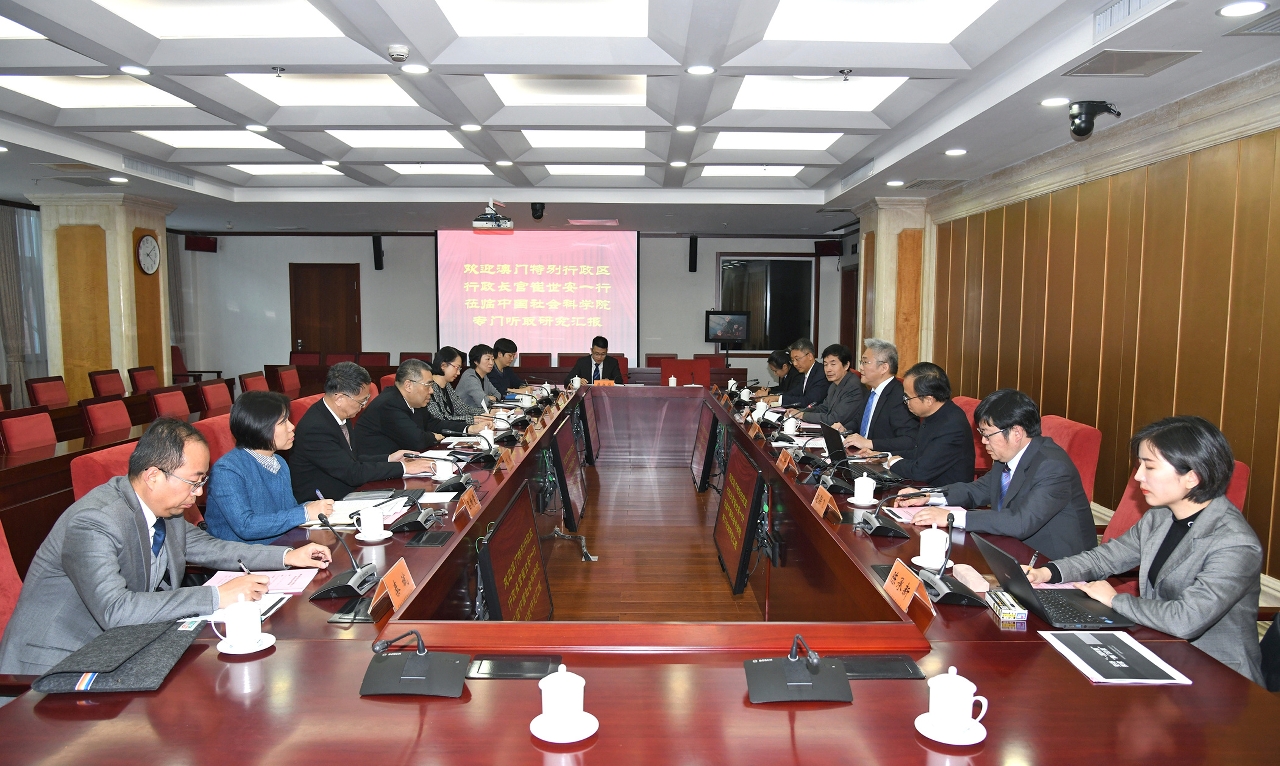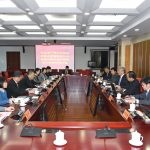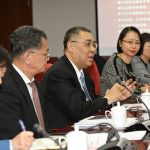 The Chief Executive, Mr Chui Sai On, meets representatives of the Chinese Academy of Social Sciences in Beijing.
The Chief Executive, Mr Chui Sai On, meets representatives of the Chinese Academy of Social Sciences in Beijing.
The Chief Executive, Mr Chui Sai On, today said a piece of research by the Chinese Academy of Social Sciences had aimed to provide a point of objective reference in relation to successful practise of the "One country, two systems" principle with Macao characteristics.
Mr Chui made the remarks in Beijing while meeting with officials from the Chinese Academy of Social Sciences. The Macao Special Administrative Region (SAR) Government had previously commissioned the Academy to examine in detail the Macao SAR Government’s administrative performance since Macao’s return to the motherland.
The Head of the Academy’s Institute of European Studies and of its Centre for Taiwan, Hong Kong and Macao Studies, Mr Wang Ping, gave a briefing on key preliminary findings of the research.
They included that Macao had – particularly in the current decade – handled correctly the relationship of “one country” to “two systems”. The Macao SAR Government had also managed well the relationship between economic development and livelihood improvement; and dealt precisely with the relationship between traditions and innovation. These factors had combined to support Macao’s effort in exploring a path for “One country, two systems” with Macao characteristics.
During the meeting, the two sides exchanged views on the next phase of work in the Academy’s research. Mr Chui said the research findings should incorporate ideas that illustrate – in an objective and precise manner – that the "One country, two systems" principle had been the foundation for a tremendous initiative pursued by the Central Government. Leadership and strong support from the Central Government in relation to the principle were indispensable for its successful implementation in Macao, he added.
The conclusive findings of the report should take into consideration viewpoints of Macao residents. It should also examine – fairly and scientifically – historical events, Mr Chui stated.
It was of great significance that the research was being conducted in the year of celebrations for the 70th anniversary of the founding of the People’s Republic of China and the 20th anniversary of the establishment of the Macao SAR, Mr Chui said. He acknowledged the research team’s effort, noting the research project was challenging and required to tackle relevant topics in a comprehensive manner.
During the meeting, the two sides additionally reviewed bilateral ties and the effectiveness of the cooperation mechanism between them.
The Macao SAR Government had formed since 2009 a sound mechanism for cooperation with the Academy, Mr Chui noted. The Academy had initiated a number of pieces of themed research relating to Macao’s strategic development, and other crucial topics.
Mr Chui went on to say that his frequent meetings with the Academy’s President, Mr Xie Fuzhan, illustrated the Academy’s effort in supporting Macao regarding the SAR’s development. The two officials met respectively in March and August this year.
The Chief Executive added he looked forward to extending cooperation with the Academy in order to extend bilateral exchanges in the field of social sciences, and to cultivate a greater number of pieces of research in that field. These efforts were conducive to the steady practise of the “One country, two systems” principle in Macao.
Other Macao officials present in the meeting were the Chief-of-Office of the Chief Executive’s Office, Ms O Lam; and the Director of the Policy Research and Regional Development Bureau, Mr Mi Jian.



